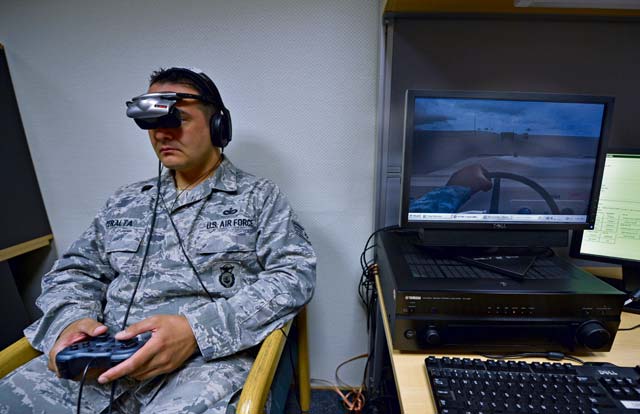
Staff Sgt. Louie Peralta, 86th Security Forces Squadron operations controller, utilizes a virtual reality trainer Aug. 8 on Ramstein. The 86th Medical Group offers virtual reality therapy in conjunction with traditional therapy to treat post-traumatic stress disorder.
Post-traumatic stress disorder is an issue the 86th Medical Group has been treating with traditional and virtual reality methods for more than three years.
Social workers at the mental health clinic have customized virtual reality simulators used to treat PTSD in unison with traditional therapy. Patients utilizing the simulator can relive situations that closely mimic conditions within a vehicle convoy or foot patrol.
“We are trying to emulate a scenario for someone who has convoyed in Iraq or Afghanistan before,” said Capt. David Weller, 86th MDG social worker. “The idea is to recreate an event that might be an underlying source of some of their problems and then be able to have them start to talk about it. Creating a pathway that will allow them to begin to get a handle on anxiety levels and one day eventually be able to control it.”
Virtual reality scenarios are only used to supplement the already in place therapy for those diagnosed with PTSD. Working in tandem with social workers, a virtual reality session and a therapy session generally last one hour to 1.5 hours.
“It affects everyone differently,” said Staff Sgt. Louie Peralta, 86th Security Forces Squadron operations controller. “I came in really not knowing what to expect. For me, the virtual reality simulator brought back memories I was repressing, and I was then able to begin talking about.”
Being able to process, talk about and then slowly breakdown the situation is what leads to lower levels of anxiety Weller said.
“People will have sudden memory recoveries from situations they might have been unknowingly suppressing,” said Maj. Donald Christman, 86th MDG mental health flight commander. “This allows many to flesh out and gain a firmer grasp around the situation that has been so
problematic.”
For more information about PTSD treatment call the mental health clinic at 479-2390.


